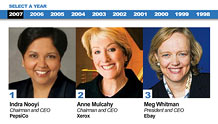Women on boards (Not!)'Diversity' is the buzzword du jour, but when it comes to corporate boards, there is more talk than action: Women make up only one out of six company directors. Does that affect corporate performance?(Fortune Magazine) -- There's lots of good news about the rise of women in the corporate world, such as the 29 CEOs of public companies in our global Most Powerful Women rankings and an impressive lineup of female CEOs-in-waiting. Behind the headlines, though, there is a hidden phenomenon. A surprisingly large number of corporate giants still have no women directors on their boards. Surveying the 2007 proxies of the S&P 500, Spencer Stuart, the executive-search firm, found that 9% had all-male boards. That's an amazing 45 female-free zones. The list includes Apple (Charts, Fortune 500), News Corp (Charts, Fortune 500)., and Zimmer Holdings (Charts), a leader in the joint-replacement market that peddles a Gender Solutions hip designed for women.
Interactive graphic
In honor of the 10th edition of Fortune's Most Powerful Women list, we're looking back at who made the top 3 each year.
See them all "It's mind-boggling to me," says Mellody Hobson, president of Ariel Capital Management and a director at Starbucks, DreamWorks Animation SKG, and Est�e Lauder. Companies can do just fine without female directors, of course. Rupert Murdoch's News Corp. is thriving, and Apple's stock price has almost doubled in the past year. But isn't it possible that the guys who run Bear Stearns and Countrywide Financial (Charts, Fortune 500), which both took on way too much risk and suffered in the recent credit crises, might have benefited from a little estrogen in the boardroom? In fact, there may be a connection between the presence of women on boards and financial performance. Researchers at Catalyst, which monitors the progress of executive women, just completed a study showing that companies with at least three women directors performed significantly better than average in terms of return on equity and return on sales (both six percentage points better) and return on invested capital (four percentage points better). Catalyst's study, strangely, covers 2001 to 2004. Even so, the results are intriguing. So why don't boards mix it up more? For one thing, women are choosy. Pitney Bowes (Charts, Fortune 500) chairman Mike Critelli, who has two female directors and is looking for a third, says with frustration, "We've been turned down a lot by interesting candidates." The best-qualified women, he says, tend to have many corporate suitors, typically growth companies in growth industries like technology and consumer goods. "He's correct," says Julie Daum, who heads Spencer Stuart's North American board-search practice. "And if they're working CEOs, like Meg Whitman or Andrea Jung or Anne Mulcahy, they're likely to pick just one or two boards besides their own." Spencer Stuart found that 70% of the S&P 500 companies it surveyed say they are seeking women directors. But only 19% of new independent board members added this year were women. All told, 16% of board members are women. That's higher than ever before, but given the increasing power of women both as consumers and as leaders, the figure still seems absurdly low. Maggie Wilderotter, CEO of Citizens Communications, a telecom company, is one of the female pioneers. In July she became Yahoo's (Charts, Fortune 500) first woman director. Wilderotter, who earned her stripes at AT&T (Charts, Fortune 500) and Microsoft (Charts, Fortune 500), says she's been on 15 corporate boards and was the first woman on every one except Xerox (where she is currently a director) and McClatchy, the newspaper company. At Citizens, where she became CEO in 2004 and chairman last year, she has remade what had been an all-male, all-white board. Now Citizens' dozen directors include five women and two African-American men. "I've always suspected that companies that are inclusive and have different points of view will perform better for shareholders," Wilderotter says. Hobson predicts that diversity in boardrooms will evolve, but slowly: "I'd love to have a view that's less controversial, but I think bias still exists." |
Sponsors
|


